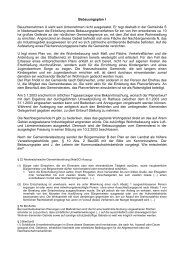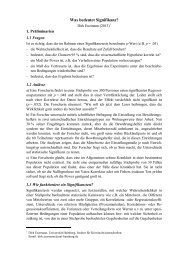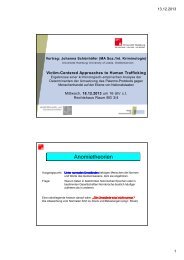Sessar Porto Problems criminology has with criminal law
Sessar Porto Problems criminology has with criminal law
Sessar Porto Problems criminology has with criminal law
You also want an ePaper? Increase the reach of your titles
YUMPU automatically turns print PDFs into web optimized ePapers that Google loves.
9<br />
surveillance, in the sense that: the less we know about risks the more we have to supervise the<br />
unknown. Should we, in addition to all this, follow Mary Douglas according to whom “risk is<br />
not a thing but a way of thinking” (1992, 46), then we will inherit the ultimate problem both<br />
in terms of epistemology and the justification of an overall risk prevention.<br />
7. Prospects in lieu of a conclusion<br />
René van Swaaningen once posed the question of whether <strong>with</strong> respect to sub-cultures, attachments,<br />
control, exclusion, aggression, and the like we still need <strong>criminology</strong> as sociology,<br />
psychology, political science, urban anthropology or neurology could do studies of this kind<br />
as well (1999, 7). He thought that the only important surplus value lies in <strong>criminology</strong>’s<br />
knowledge of the <strong>criminal</strong> justice system. In fact, we learned much about the complicated and<br />
biased procedures <strong>with</strong>in the police and the judiciary (the descriptive part of criminological<br />
investigations by way of which the existence and functioning of widely independent codes of<br />
practice were discovered); based on such rich material, labeling theory offered precious insights<br />
into the definitional processes leading to crime (the analytical part of investigations).<br />
The limitation of this approach was the emp<strong>has</strong>is on the political construction of crime while<br />
neglecting the more general epistemological aspects.<br />
The other limitation was the almost exclusive interest in the <strong>criminal</strong> justice system. The fact<br />
that <strong>law</strong> makes crime is not but a point of reference for autonomous communication processes<br />
in other functional systems affected by crime. As was already mentioned they take care to<br />
harmonize crime <strong>with</strong> their own self-referential goals either by denying, integrating, redefining<br />
or scandalizing it. Or they create it; should this provoke negative legal reactions they<br />
might try to delegitimize <strong>law</strong> or claim that strict negative reactions would have affect the system’s<br />
positive (functional) operations etc. This kind of communication turns crime into an<br />
object of negotiation, very often <strong>with</strong> an open (contingent) output. Especially those systems<br />
<strong>with</strong> strong function specifications have either much to win or much to lose through certain<br />
forms of crime; they may therefore be called ‘partners of the <strong>law</strong>’.<br />
Research in these areas is not unknown but is unstructured and lacks theoretical considerations.<br />
A new critical <strong>criminology</strong> could take over this large field in order to observe and to<br />
designate the functions of crime in the various social systems. When combined, the observations<br />
may result in an unexpected picture of crime as having its own indispensable place in<br />
society, despite its destructive qualities. Some of the subsequent questions will then be: Is this<br />
still old-fashioned “crime”? Or do we have to change our old-fashioned perceptions of it?<br />
References<br />
da Agra C. (2009), Requiem pour la guerre à la drogue. L’expérimentation portuguaise de dé<strong>criminal</strong>isation,<br />
Déviance et société 33, 27-49.<br />
Bednarz J. Jr. (1989), Translator’s Introduction, in Luhmann N., Ecological Communication, vii-xvi.<br />
Blumer H. (1969), Symbolic Interactionism: Perspective and Method, Englewood Cliffs, N.J..<br />
Boers K. (2003), Crime, fear of crime and the operation of crime control in the light of victim surveys and other<br />
empirical studies, Council of Europe, European Committee on Crime <strong>Problems</strong>, 22 nd Criminological Research<br />
Conference, Strasbourg, 24-26 November 2003.<br />
Boers K., <strong>Sessar</strong> K. (1991), Do people really want punishment? On the relationship between acceptance of restitution,<br />
needs for punishment, and fear of crime, in <strong>Sessar</strong> K., Kerner H.-J. (eds.), Developments in crime and<br />
crime control research. German Studies on Victims, Offenders, and the Public, New York et al., Springer, 126-<br />
149.<br />
Bourdieu P. (1987), The Force of Law: Toward a Sociology of the Juridical Field, Hastings Law Journal 38,<br />
814-853.

















